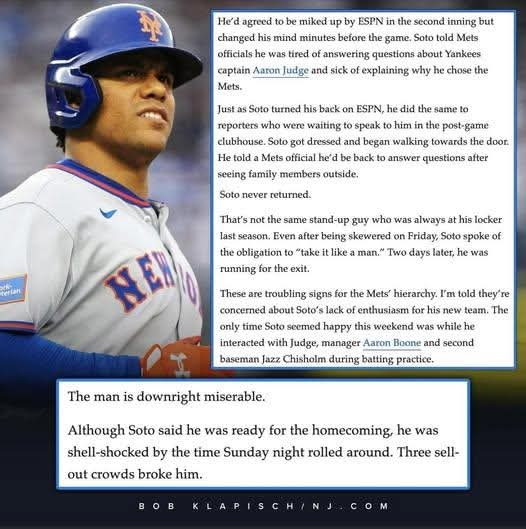Soto Chose to Chase the Money — Left the Yankees for a Lesser Team, and Now He’s Paying the Price
There was a time when Juan Soto was considered one of the brightest stars in baseball—a generational hitter with plate discipline beyond his years and a World Series ring already on his résumé. But as the dust settles on his controversial free agency decision, fans and analysts alike are asking the same question: Did Soto trade greatness for a paycheck? Because right now, he doesn’t look like the same player who once lit up October. He looks broken.
When Soto turned down the opportunity to remain with the New York Yankees—the most iconic franchise in sports—it shocked the baseball world. The Yankees had embraced him, their fans were already dreaming of his plaque in Monument Park, and his swing seemed tailor-made for Yankee Stadium. But when another franchise, a team with a checkered record of competitiveness, threw a mountain of cash his way, Soto took the money. And that decision may haunt him more than he ever expected.
The move was framed as a “business decision,” and no one can fault a player for seeking financial security. But baseball, especially at Soto’s level, is more than business—it’s about legacy. The Yankees offered a chance to join the pantheon of legends, to wear pinstripes alongside the ghosts of Ruth, Gehrig, DiMaggio, Mantle, and Jeter. With Soto’s talent, he had the potential to become the next great Yankee icon. Instead, he chose a franchise with little championship pedigree and a history of mediocrity.
And now? He’s struggling.
Since joining his new team, Soto’s numbers have dipped. His swing looks hesitant. The swagger that once defined his at-bats has faded. His body language suggests frustration, and his team is underperforming—again. The spotlight is dimmer, the pressure less intense, but so is the support. No longer surrounded by a championship culture, Soto appears adrift.
Critics point to the loss of motivation that sometimes follows massive contracts, but it feels deeper than that. It’s the absence of purpose that comes when a player walks away from greatness. The Yankees don’t just expect to win—they demand it. That pressure pushes players to elevate their game. Soto, instead, finds himself on a second-rate team with lower expectations, less national attention, and far fewer opportunities to compete on the game’s biggest stage.
Could he turn it around? Absolutely. Soto is still young and immensely talented. But baseball is a game of confidence, rhythm, and environment. Right now, he’s in the wrong one. And the longer he stays away from the game’s elite culture, the more his game seems to suffer.
There’s still time for redemption. Stars have rebounded from worse. But the road back to greatness may require more than a hot streak—it may require a return to a team that plays for more than just stats and salary.
For now, though, Soto stands as a cautionary tale: a superstar who chose money over legacy, and who may have lost a piece of himself in the process. In leaving the Yankees, he may not have just walked away from the greatest franchise in sports—he may have walked away from his own greatness.
